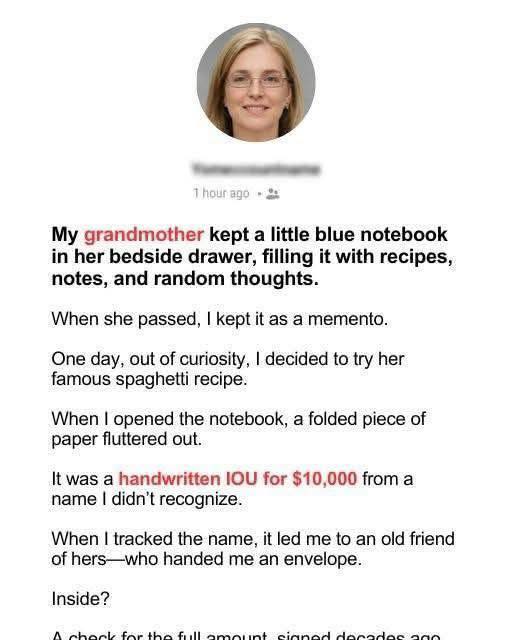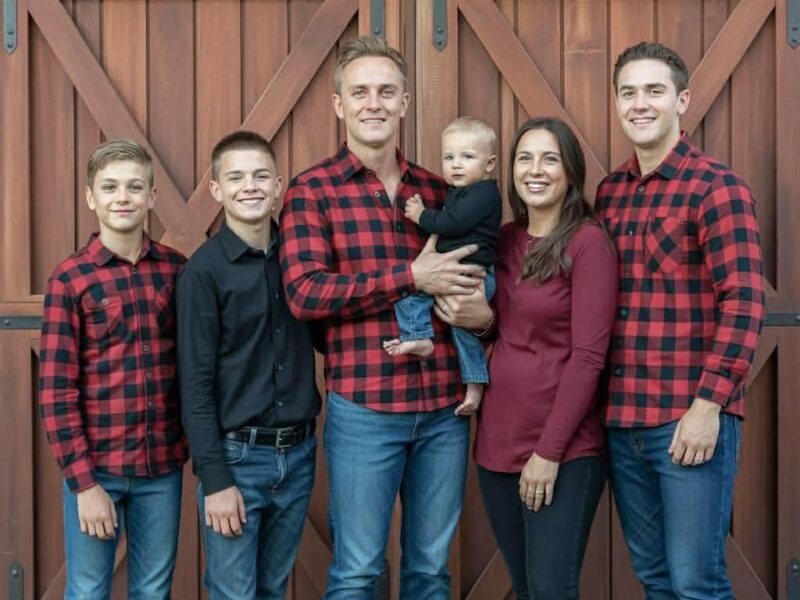My grandmother, Grace, kept a little blue notebook in her bedside drawer. It wasn’t just a place for recipes; it was where she wrote down her thoughts, reminders, and memories. A patchwork of her life, one page at a time. When she passed away, I kept that notebook close as a memento of her. It was one of the few things I had left that felt truly hers.
One day, driven by curiosity, I decided to make her famous spaghetti recipe—a dish she had made so many times for family gatherings, always adding a little extra love with each stir of the spoon. As I opened the notebook to find the recipe, something unexpected happened. A folded piece of paper fluttered out from between the pages.
It was a handwritten IOU for $10,000, signed by someone I didn’t recognize.
Confused, I tracked down the name, and it led me to an old friend of my grandmother’s, a kind woman named Doris. She knew the whole story and handed me an envelope with a gentle but knowing smile.
Inside the envelope was a check for the full amount, a check that had been written decades ago.
The check was faded, the ink slightly smudged, but still legible. The name on it read “Arthur Callahan,” a name that seemed familiar in a distant, unplaceable way. My mind raced as I tried to understand the story behind this mysterious debt. Why had my grandmother lent such a large sum of money? And why had Arthur never cashed it?
I had to know more.
Doris’s voice shook as she spoke, her eyes glistening with emotion. “Your grandmother… she had a way of seeing the good in people, even when they couldn’t see it themselves. She believed in Arthur when no one else would.”
“Why did she lend him that money?” I asked, feeling the weight of the envelope in my hands.
Doris hesitated before answering, as though remembering a time long past. “Arthur was struggling. His wife was very ill, and the medical bills were piling up. He was too proud to ask anyone for help, but your grandmother… she wasn’t the type to wait for someone to ask. She just gave it to him, no questions asked. She told him, ‘You can pay it back when you’re able.’ She believed in him. She always did.”
The words hit me like a wave. That was my grandmother—so selfless, so full of faith in people, even in their lowest moments.
Doris continued, “Arthur tried to pay her back several years later, but she wouldn’t take it. She said, ‘You’ll know when the time is right.’”
I stared at the check, my heart heavy with the weight of this revelation. “And now he’s giving it back?”
Doris smiled softly. “Arthur passed away last year. Before he died, he told his son to find you—or whoever was closest to your grandmother—and make sure the money went back to her family. He wanted to honor her memory.”
The tears welled up in my eyes. The thought of Arthur holding on to this debt for so long, of my grandmother’s belief in him never wavering, was overwhelming. I thanked Doris, feeling the quiet ache of a love and kindness that spanned decades, and left with the envelope clutched tightly in my hands.
At home, I sat down at the kitchen table, staring at the check in my hands. It wasn’t about the money—it was about the legacy my grandmother had left behind. She had lived her life with an unwavering belief in the goodness of others, and this was just one more example of the quiet impact she had made on the world.
I decided to use this unexpected windfall in a way that would honor her memory. I contacted a local community center that provided programs for underprivileged families. After explaining the story behind the money, the director and I came up with a plan: we would create a scholarship fund in my grandmother’s name. It would help young people achieve their dreams, just as my grandmother had helped Arthur when he needed it most.
The response to the scholarship fund was overwhelming. As word spread, I began receiving letters and phone calls from people whose lives had been touched by my grandmother. One woman wrote about how my grandmother had helped her learn to read when she was a child. A man shared how my grandmother had brought soup to his family every week when his father was out of work. Each story painted a picture of a woman who had quietly changed lives in ways I hadn’t fully understood until now.
Then, I received a letter from Arthur’s son, Daniel. He wrote about how his father had always spoken of my grandmother with deep respect and gratitude. “She didn’t just save my parents’ lives,” he wrote. “She gave them hope when they had none. She believed in them when they couldn’t believe in themselves.”
Daniel asked if he could meet me to talk more about the scholarship fund and share some memories of my grandmother. When we met, he brought a photo of her with his parents, taken decades ago. In the picture, my grandmother was laughing, her arm around Arthur’s wife. The image captured a moment of pure joy, as if the weight of the world had been momentarily lifted.
“She had a way of making everyone feel like they mattered,” Daniel said, his voice thick with emotion.
I nodded, tears streaming down my face. “She really did.”
The scholarship fund, now known as the Grace Foundation, grew quickly thanks to donations from people who had known my grandmother and others inspired by her story. The foundation’s motto became: “A little kindness goes a long way.”
The first recipient of the scholarship was a young woman named Sofia, who dreamed of becoming a teacher. At the awards ceremony, she spoke about how the scholarship had changed her life, giving her the chance to pursue an education she never thought possible. Watching her speak, I felt a deep sense of peace. My grandmother’s legacy was alive, woven into the lives of every person the scholarship would touch.
That night, I opened her little blue notebook again, running my fingers over the worn pages. I found her spaghetti recipe and decided to make it, just as I had planned to before this incredible journey began. As the scent of tomatoes and garlic filled the kitchen, I felt my grandmother’s presence, warm and comforting, as if she were sitting at the table with me.
When the pasta was ready, I raised a forkful to the empty chair across from me. “Thank you, Grandma,” I whispered. “For everything.”
In that moment, I understood that her greatest gift wasn’t the money, the recipes, or even the stories people shared. It was the way she had lived her life—with love, generosity, and faith in the goodness of others.
The Grace Foundation continues to grow, helping more young people every year. Every time I hear a new recipient’s story, I think of my grandmother and the little blue notebook that started it all.
Her legacy is proof that even the smallest acts of kindness can ripple outward, changing lives in ways we might never fully understand.
So here’s to my grandmother, Grace, and to the lessons she taught us all: Be kind. Believe in people. And always leave the world a little brighter than you found it.
If this story touched your heart, please like and share it with others. Let’s keep spreading Grace’s message of kindness and hope. You never know who might need it.


